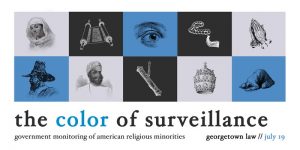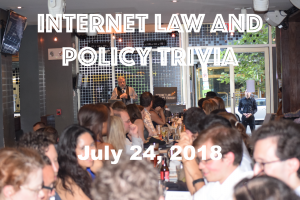Home
Use our global calendar of privacy events to locate an event near you.
FILTER BY

Educational Data Mining is a leading international forum for high-quality research that mines data sets to answer educational research questions that shed light on the learning process. These data sets may originate from a variety of learning contexts, including learning management systems, interactive learning environments, intelligent tutoring systems, educational games, and data-rich learning activities. Educational data mining considers a wide variety of types of data, including but not limited to raw log files, student-produced artifacts, discourse, multimodal streams such as eye-tracking, and other sensor data. The overarching goal of the Educational Data Mining research community is to better support learners by developing data-driven understandings of the learning process in a wide variety of contexts and for diverse learners.
Please join us at the upcoming Washington, DC KnowledgeNet Chapter meeting and discuss Artificial Intelligence (AI). Artificial intelligence and machine learning offer considerable opportunity to redefine business and society through increased productivity, innovation, and growth. AI also creates new legal, regulatory, and policy challenges for stakeholders to address, including in the areas of privacy, data protection, law enforcement, and ethics. This panel presentation will discuss recent developments in example AI technologies, key legal implications, and potential frameworks for addressing AI challenges.
The one hour panel presentation will begin at 5 p.m. followed by a cocktail hour from 6 – 7 p.m.
Panelists:
- Tiffany George, Senior Attorney, Federal Trade Commission Bureau of Consumer Protection, Division of Privacy and Identity Protection
- Britanie Hall, CIPP/US, Senior Associate, Hogan Lovells
- Brenda Leong, CIPP/US, Senior Counsel and Director of Strategy, Future of Privacy Forum
Moderator:
- Mark Brennan, Partner, Hogan Lovells
|
|||||
|

Across our country’s history – from the surveillance of the Separatists we now know as Pilgrims in 16th and 17th century England, to federal house raids and interrogations of early Mormons in the Utah Territory in the 19th century, to the 20thcentury surveillance of Jewish, Muslim, Quaker, and Sikh communities, to modern post-9/11 surveillance systems –government monitoring has long had a deep and disparate impact on American religious minorities.
The Color of Surveillance: Government Monitoring of American Religious Minorities will trace that history, and ask hard questions about what it means: Is modern surveillance consistent with the intentions of the American founders – or, for that matter, the events that precipitated the migration of English Separatists to the New World on the Mayflower? Do modern counterterrorism initiatives appropriately protect civil rights and civil liberties? How are local communities, advocates, and artists responding to these challenges?
Now in its third year, The Color of Surveillance, organized by the Center on Privacy & Technology at Georgetown Law, convenes academic, policy and government experts alongside local and community activists and artists. Prior speakers have included the Pulitzer-winning biographers of Martin Luther King, Jr. and W.E.B. DuBois, Guggenheim award-winning artists, and the general counsel of the Federal Bureau of Investigation.
Welcome & Introduction to The Color of Surveillance: Government Monitoring of Religious Minorities
8:45 – 9:00am
Dean William Treanor, Georgetown Law
Alvaro Bedoya, Center on Privacy & Technology at Georgetown Law
Elizabeth I to the Early 20th Century
9:00 – 10:15am
“Hunted”: 16th & 17th Century Surveillance of Pilgrims
John Coffey, University of Leicester
Is the United States a Christian Nation?
Brooke Allen, Bennington College
“Mohammedan Barbarism”: The Campaign Against Early Mormons
J. Spencer Fluhman, Brigham Young University
The Military Intelligence Division and American Jews
Alvaro Bedoya, Center on Privacy & Technology at Georgetown Law
The FBI and the Moorish Science Temple of America
Sylvester A. Johnson, Virginia Tech
BREAK
10:15 – 10:30am
The 1960s to the Aftermath of 9/11
10:30 – 12:05pm
J. Edgar Hoover, Black Clergy, and Martin Luther King, Jr.
Lerone A. Martin, PhD, Danforth Center on Religion and Politics at Washington University in St. Louis
The Feeling of Being Watched: A Filmmaker’s Response
Assia Boundaoui, The Inverse Surveillance Project
Rabia Boundaoui
Xiangnong (George) Wang (moderator), Center on Privacy & Technology at Georgetown Law
Post-9/11 Watchlists
Hina Shamsi, ACLU National Security Project
Community Reflections
Members of the Center for Media Justice’s National Delegation of MASA Community Activists
LUNCH BREAK
12:05 – 1:00pm
Life in Affected Communities
1:00 – 2:45pm
A Conversation on Countering Violent Extremism
Faiza Patel, Brennan Center for Justice
Ayaan Dahir, Young Muslim Collective
Eric Rosand, The Prevention Project
William Braniff, START, University of Maryland
Alvaro Bedoya (moderator), Center on Privacy & Technology at Georgetown Law
“Mosque Crawlers” and the Raza and Hassan cases
Asad Dandia, NYU Graduate Student
Farhaj Hassan, Muslims United For Justice
Laura Moy (moderator), Center on Privacy & Technology at Georgetown Law
“If they should come for us”: A Poet’s Response
Fatimah Asghar
Renata Barreto (moderator), Center on Privacy & Technology at Georgetown Law
BREAK
2:45 – 3:00pm
Community Action
3:00 – 5:25pm
Organizing after Raza
Fahd Ahmed, DRUM – Desis Rising Up & Moving
Stopping the Digital Muslim Ban: A Case Study
Rachel Levinson-Waldman, Brennan Center for Justice
Natasha Duarte, Center for Democracy & Technology
Yolanda C. Rondon, American-Arab Anti-Discrimination Committee
Steven Renderos, Center for Media Justice
Harrison Rudolph (moderator), Center on Privacy & Technology at Georgetown Law
Organizing in Silicon Valley
Maya Berry, Arab American Institute
Michelle Miller, Coworker.org
Jameson Spivack (moderator), Center on Privacy & Technology at Georgetown Law
Organizing Locally
Brian Hofer, Oakland Privacy
Religious Surveillance and Intersectionality
Brandi Collins-Dexter, Color Of Change
“Stealth Wear”: An Artist’s Response
Adam Harvey
Closing Remarks
5:25 – 5:30pm
Reception to follow in Hart lobby
Speakers:
- Fahd Ahmed of Desis Rising Up and Moving, a grassroots organizer on the issues of racial profiling, immigrant justice, and police accountability
- Professor Brooke Allen of Bennington College, author of Moral Minority: Our Skeptical Founding Fathers, a New York Times notable book
- Poet Fatimah Asghar, author of If They Come For Us & co-creator of the Emmy-nominated web series Brown Girls
- William Braniff of the National Consortium for the Study of Terrorism and Responses to Terrorism (START), studies CVE and alternative counterterrorism approaches
- Filmmaker Assia Boundaoui, director of The Feeling of Being Watched, a “riveting” account (New York Times) of surveillance of a suburban Muslim community in the 1990s
- Professor John Coffey of the University of Leicester, a scholar of Tudor and Stuart-era surveillance of the Puritans we now know as Pilgrims
- Brandi Collins-Dexter of Color Of Change, a civil rights advocate on media, environmental justice, and economic issues
- Ayaan Dahir of the Minneapolis Young Muslims Collective, a Somali American youth leader and civil liberties advocate
- Asad Dandia, M.A. candidate in Middle Eastern Studies at New York University and plaintiff in the Raza v. NYPD case
- Natasha Duarte of the Center for Democracy & Technology, author of Mixed Messages: The Limits of Automated Social Media Analysis
- Professor Spencer Fluhman of Brigham Young University, author of “An ‘American Mahomet’: Joseph Smith, Mohammad, and the Problem of Prophets in Antebellum America”
- Artist Adam Harvey, creator of Stealth Wear, a clothing collection “inspired by traditional Islamic dress… reimagined in the context of drone warfare”
- Syed Farhaj Hassan, a Sergeant in the U.S. Army Reserve and lead plaintiff in the Hassan v. City of New York case
- Brian Hofer of Oakland Privacy and the Privacy Advisory Commission of the City of Oakland, an advocate for local anti-surveillance legislation
- Professor Sylvester Johnson of Virginia Tech’s Center for the Humanities, co-editor of The FBI and Religion: Faith and National Security before and after 9/11
- Rachel Levinson-Waldman of the Brennan Center for Justice, co-coordinator of the Immigrant Surveillance Working Group
- Professor Lerone Martin of the John C. Danforth Center on Religion and Politics, a scholar on the FBI’s mobilization of African American clergy to discredit Dr. Martin Luther King, Jr.
- Michelle Miller of coworker.org, leading facilitator of tech sector employee activism and mobilization
- Faiza Patel of the Brennan Center for Justice, author of an in-depth critique of federal CVE programs
- Steven Renderos of the Center for Media Justice, co-organizer of a grassroots petition to IBM opposing the company’s interest in ICE’s “Digital Muslim Ban”
- Yolanda Rondon of the American-Arab Anti-Discrimination Committee, a civil rights attorney critical of DHS surveillance initiatives
- Eric Rosand of the Prevention Project: Organizing Against Violent Extremism, a non-resident Senior Fellow at Brookings, and a former State Department senior CVE official
- Hina Shamsi of the American Civil Liberties Union, which is challenging watchlists as unfair and discriminatory

We are delighted to announce Isabelle Falque-Pierrotin as the opening keynote speaker for the 2018 summit. As President of the French Data Protection Authority and former Chair of the EU Article 29 Working Party, Isabelle is truly a global influencer. She led the EU process to develop the general Data Protection Regulations (GDPR) that take effect in May 2018, granting individuals tough new privacy protections for personal data.
Our 8th annual conference will be the biggest yet in a game-changing year, as GDPR become a significant influence on multi-national corporations’ management of individuals’ personal data, irrespective of where they are headquartered.
Places are limited so please register today to join us at the 2018 Data Privacy summit.
When: July 24th – 26th 2018.
Where: The Lyndon Baines Johnson Presidential Library, University of Texas, Austin. TX
Attendance: Free to the public or to watch via live-streaming video.
A limited number of reserved seats are available plus optional off-campus tours to explore Austin’s innovative technology and health communities, tickets to the July 24th Celebration of Privacy Gala Dinner when Isabelle Falque-Pierrotin will receive the Louis D Brandeis Privacy Award.

George J. Tomko, Ph.D.
Abstract: SmartData is the evolution of Privacy by Design – PbD 2.0, which moves control from the organization and places it directly in the hands of the data subject, where it belongs. Instead of having a one-to-many oversight mechanism wherein one organization is responsible for protecting the privacy of many individuals, the goal is to evolve a one-to-one oversight mechanism whereby an individual would be responsible for one set of personal data – one’s own data. In a world where personal information can increasingly be transmitted and used in multiple locations simultaneously, protecting privacy may only truly be accomplished if the information itself becomes ‘intelligent’ and capable of making appropriate decisions, relating to its release, on behalf of the data subject. In other words, the data must become “smart.” Accordingly, protecting privacy and security becomes a multi-domain task, where each domain must be seamlessly integrated into a functioning whole which we call SmartData. However, using deep learning techniques alone becomes problematic in terms of seamlessly integrating many domains, current and future, into a functioning whole that can also learn online.
Instead, the proposed methodology for SmartData is based upon embodied software agents within a virtual world, learning models of the world within a framework of evolutionary computation and dynamical systems. Embodied cognition is a growing field of research that emphasizes the formative role that both an agent’s “body” and the environment will play in the development of cognitive processes, primarily through the role of evolved primary actions. The general theory posits that these processes develop when tightly-coupled systems emerge from real-time, goal-directed interactions between agents and their environments, in our case, in a simulated virtual environment. The goal of SmartData is to surpass current limited and brittle data protection methods by being able to respond to unforeseen situations (exceptions to the rules), adapt to these novel circumstances, and provide an accurate, nuanced and contextual representation of an individual’s privacy and data security preferences.
Bio: Adjunct Professor in Computer Science at Ryerson University and Expert-in-Residence at IPSI (Privacy, Security and Identity Institute) at the University of Toronto. Dr. Tomko invented the privacy-enhancing technology “Biometric Encryption,” as well as “Anonymous Database,” both of which were the subject of patents. Later he invented “SmartData,” and is presently working on developing SmartData Intelligent Agents. Dr. Tomko holds over a dozen patents in the areas of optical computing and biometric encryption. He received his Ph.D. in Neuroscience from the University of Toronto as well as undergraduate degrees in Engineering Physics, Electrical Engineering and an Executive MBA. He was Vice-President and General Manager of Chubb Security, after which he co-founded two technology companies where he served as President and CEO, one of which he took public on the Toronto Stock Exchange. He also served as Chairman of Photonics Research Ontario, an Ontario Centre of Excellence. Dr. Tomko began his professional career as an officer in the Canadian Armed Forces (Navy branch) where he served on submarines and destroyers and also designed anti-missile electronic countermeasure systems.

Konstantinos N. (Kostas) Plataniotis
Abstract: The recent rise of artificial intelligence (AI) can be attributed to the success of deep neural networks (DNN) in tasks, such as image classification and natural language processing. The availability of curated, large scale and diverse data sets, access to powerful computing infrastructure, and theoretical advances are the main driving factors behind the resurgence. Machine learning (ML), deep neural nets, smart analytics are all trending tools promising disruptive contributions capable of solving real-world problems. Thus, it is not surprising to see a sustained push from industry, policy makers, and government bodies towards accelerating developments in machine learning. The purpose of this presentation is to provide an environmental scan of the research landscape, introduce, in a tutorial style, aspects of the research machinery, and discuss intuition, utility and expectations.
Bio: Konstantinos N. (Kostas) Plataniotis is a Professor and the Bell Canada Chair in Multimedia with the Electrical and Computer Engineering Department, University of Toronto, Toronto, ON, Canada. He is the co-founder and inaugural Director-Research for the Identity, Privacy and Security Institute (IPSI), University of Toronto, and he served as the Director of the Knowledge Media Design Institute (KMDI), University of Toronto, from January 2010 to July 2012. His research interests are knowledge and digital media design, multimedia systems, biometrics, image and signal processing, communications systems, and machine learning. Dr. Plataniotis is a Registered Professional Engineer in the Province of Ontario, a Fellow of IEEE, a Fellow of the Engineering Institute of Canada. He was the IEEE Signal Processing Society Vice President for Membership (2014–2016) and he has served as the Editor-in-Chief of IEEE SIGNAL PROCESSING LETTERS, as Technical Co-Chair of the IEEE 2013 International Conference in Acoustics, Speech and Signal Processing, and as General Co-Chair for the 2017 IEEE GlobalSIP Conference. Dr. Plataniotis is the General Co-Chair for the 2018 International Conference on Image Processing (ICIP-18) and the General Co-Chair for the 2021 IEEE International Conference on Acoustics, Speech and Signal Processing (ICASSP 2021).

May 25th didn’t just mark the start of the GDPR Enforcement Era, it also saw the arrival of the European Data Protection Board (EDPB). Replacing the Article 29 Working Party, this new body is at the centre of the new data protection landscape in the EU with a remit to ensure that the data protection law is applied consistently across the EU and to ensure effective cooperation amongst Data Protection Authorities. The Board will not only issue guidelines on the interpretation of core concepts of the GDPR, but also be called to rule by binding decisions on disputes regarding cross-border processing.
This webinar will introduce the new GDPR enforcer and provide insights and best practices to help you understand the latest regulatory priorities including GDPR certification and ePrivacy Regulation.
Can’t make it? Register anyway – we’ll automatically send you an email with both the slides and recording after the webinar!
TrustArcWebinar FAQs: Click here for answers to the most commonly asked webinar related questions.

Following a series of data breaches and privacy scandals, most notably the controversy surrounding Facebook’s engagement with political firm Cambridge Analytica, there has been increasing discussion over whether Congress should establish comprehensive legislation to protect American consumers’ online privacy. Achieving broad privacy legislation will be a challenge for legislators, given the rapid pace of innovation, but in the coming months, Congress may feel compelled to act. With the recent implications of the EU’s adoption of the General Data Protection Regulations (GDPR), public pressure may also encourage congressional action.
On July 26, the Center for Technology Innovation at Brookings will host a panel discussion to explore a comprehensive framework for U.S. privacy legislation. The discussion will address both the opportunities and challenges associated with such legislation during a period where big data analytics are fueling the new economy and online consumer data is being manipulated and mined for undemocratic purposes. What should be included in federal privacy legislation? Is either the GDPR or the California Consumer Privacy Act a good model? What types of companies and business models should be covered by legislation? Should different types of companies in the internet ecosystem be regulated the same under a federal system? Which government entity should be responsible for enforcing online privacy guardrails?
After the session, panelists will take audience questions.


